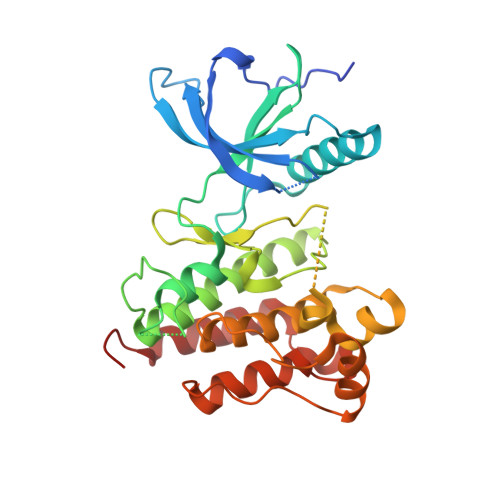2-Oxo-3, 4-dihydropyrimido[4, 5-d]pyrimidinyl derivatives as new irreversible pan fibroblast growth factor receptor (FGFR) inhibitors.
Li, X., Guise, C.P., Taghipouran, R., Yosaatmadja, Y., Ashoorzadeh, A., Paik, W.K., Squire, C.J., Jiang, S., Luo, J., Xu, Y., Tu, Z.C., Lu, X., Ren, X., Patterson, A.V., Smaill, J.B., Ding, K.(2017) Eur J Med Chem 135: 531-543
- PubMed: 28521156
- DOI: https://doi.org/10.1016/j.ejmech.2017.04.049
- Primary Citation of Related Structures:
5UR1 - PubMed Abstract:
A series of 2-oxo-3, 4-dihydropyrimido[4,5-d]-pyrimidinyl derivatives were designed and synthesized as new irreversible inhibitors of the FGFR family. One of the most promising compounds 2l potently inhibited FGFR1/2/3 with IC 50 values of 1.06, 0.84 and 5.38 nM, respectively, whereas its potency against FGFR4 was diminished by an order of magnitude. Compound 2l strongly suppresses the proliferation of FGFR1-amplified H520 non-small cell lung cancer cells, FGFR2-amplified SUM52 breast cancer cells and FGFR3-amplified SW780 bladder cancer cells with low nanomolar IC 50 values, but was significantly less potent against four FGFR-negative cancer cell lines, with low micromolar IC 50 values. Biological investigation also confirmed the irreversible binding of the molecule with the FGFR1-3 target kinases. Compound 2l may serve as a promising new lead for further anticancer drug discovery.
Organizational Affiliation:
Guangzhou Institutes of Biomedicine and Health, Guangdong Provincial Key Laboratory of Biocomputing, Chinese Academy of Sciences, No.190 Kaiyuan Avenue, Guangzhou 510530, China; University of Chinese Academy of Sciences, No. 19 Yuquan Road, Beijing 100049, China.















